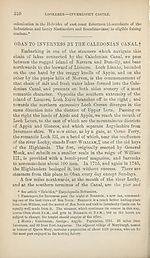Download files
Complete book:
Individual page:
Thumbnail gallery: Grid view | List view

surrections of 1715 and 1745, showed how futile were all such efforts. It
was not till 1748, when a decisive blow was struck at the power of the
chiefs by the abolition of heritable jurisdictions, and the appointment of
sheriffs in the different districts, that the arts of peace and social improve¬
ment made way in these remote regions.
The change was great, and at first not unmixed with evil. It was no
longer the interest of the chief to surround himself with a host of depen¬
dents. His strength lay in money, not in arms. A new system of ma¬
nagement and high rents were imposed, in consequence of which numbers
of the tacksmen, or large tenants, emigrated to America. In twenty years,
from 1772 to 1792, about 6400 persons left the country, carrying with
them in specie at least £38,400. The exodus continued for many years.
Sheep-farming on a large scale was next introduced, and the crofters were
thrust into villages or barren corners of the land. The consequence was,
that, despite the numbers who entered the army, or emigrated to Canada,
the standard of civilisation sunk lower, and the population multiplied in
l all the islands. To elevate them must be the work of many years; and
a still more extensive family emigration seems necessary as a preliminary
step. Education in the English language is also required, to which
I should he added the prosecution of the fisheries on a better basis, and the
I
was not till 1748, when a decisive blow was struck at the power of the
chiefs by the abolition of heritable jurisdictions, and the appointment of
sheriffs in the different districts, that the arts of peace and social improve¬
ment made way in these remote regions.
The change was great, and at first not unmixed with evil. It was no
longer the interest of the chief to surround himself with a host of depen¬
dents. His strength lay in money, not in arms. A new system of ma¬
nagement and high rents were imposed, in consequence of which numbers
of the tacksmen, or large tenants, emigrated to America. In twenty years,
from 1772 to 1792, about 6400 persons left the country, carrying with
them in specie at least £38,400. The exodus continued for many years.
Sheep-farming on a large scale was next introduced, and the crofters were
thrust into villages or barren corners of the land. The consequence was,
that, despite the numbers who entered the army, or emigrated to Canada,
the standard of civilisation sunk lower, and the population multiplied in
l all the islands. To elevate them must be the work of many years; and
a still more extensive family emigration seems necessary as a preliminary
step. Education in the English language is also required, to which
I should he added the prosecution of the fisheries on a better basis, and the
I
Set display mode to:
![]() Universal Viewer |
Universal Viewer | ![]() Mirador |
Large image | Transcription
Mirador |
Large image | Transcription
| Antiquarian books of Scotland > Scotland/Scots > Black's picturesque tourist of Scotland > (639) |
|---|
| Permanent URL | https://digital.nls.uk/130035858 |
|---|
| Description | Thousands of printed books from the Antiquarian Books of Scotland collection which dates from 1641 to the 1980s. The collection consists of 14,800 books which were published in Scotland or have a Scottish connection, e.g. through the author, printer or owner. Subjects covered include sport, education, diseases, adventure, occupations, Jacobites, politics and religion. Among the 29 languages represented are English, Gaelic, Italian, French, Russian and Swedish. |
|---|

